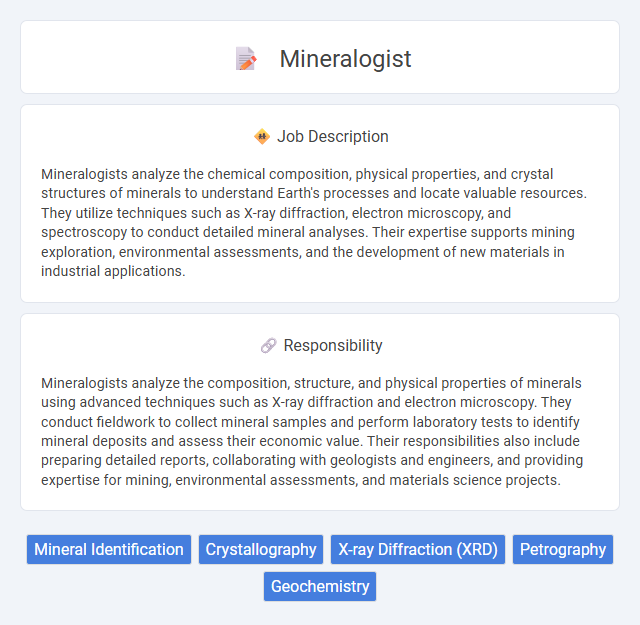
Mineralogists analyze the chemical composition, physical properties, and crystal structures of minerals to understand Earth's processes and locate valuable resources. They utilize techniques such as X-ray diffraction, electron microscopy, and spectroscopy to conduct detailed mineral analyses. Their expertise supports mining exploration, environmental assessments, and the development of new materials in industrial applications.
People with a strong interest in earth sciences and attention to detail are likely suitable for a career as a mineralogist. Those who enjoy laboratory work, field studies, and data analysis may find the job engaging and fulfilling. Individuals who prefer physical activity and working outdoors might face challenges, as the role often involves careful examination of minerals in controlled settings.
Qualification
A mineralogist typically requires a bachelor's degree in geology, earth science, or a related field, with many employers preferring candidates holding a master's or doctoral degree for advanced research roles. Expertise in techniques such as X-ray diffraction, electron microscopy, and spectroscopy is essential for analyzing mineral composition and structure. Strong analytical skills, proficiency in laboratory procedures, and knowledge of geological software are critical qualifications for success in mineral identification and classification.
Responsibility
Mineralogists analyze the composition, structure, and physical properties of minerals using advanced techniques such as X-ray diffraction and electron microscopy. They conduct fieldwork to collect mineral samples and perform laboratory tests to identify mineral deposits and assess their economic value. Their responsibilities also include preparing detailed reports, collaborating with geologists and engineers, and providing expertise for mining, environmental assessments, and materials science projects.
Benefit
A career as a mineralogist likely offers benefits including opportunities for advancing scientific understanding of earth materials and contributing to resource discovery. There is a probability of working in diverse environments ranging from fieldwork in remote locations to laboratory analysis. Financial rewards and job stability may be influenced by demand in mining, environmental consulting, and academic research sectors.
Challenge
The role of a mineralogist likely involves tackling complex geological puzzles, requiring strong analytical skills to identify and classify minerals accurately. Challenges may arise from working in harsh field conditions and interpreting data from varied rock formations, demanding adaptability and precision. Success in this job probably depends on staying updated with technological advances to improve mineral identification and extraction methods.
Career Advancement
Mineralogists specializing in advanced analytical techniques and field research in geochemistry experience significant career advancement opportunities. Expertise in X-ray diffraction, scanning electron microscopy, and spectroscopic analysis enhances prospects for leadership roles in mining, environmental consulting, and academic research. Continuous professional development and publication in peer-reviewed journals are critical for achieving senior positions and securing tenure in research institutions.
Key Terms
Mineral Identification
Mineralogists specialize in mineral identification by analyzing physical and chemical properties using techniques such as X-ray diffraction, electron microprobe analysis, and spectroscopy. They systematically classify minerals based on crystallography, hardness, optical properties, and chemical composition to support geological research and resource exploration. Expertise in mineral identification aids in interpreting geological formations and assessing mineral deposits for mining and environmental applications.
Crystallography
A mineralogist specializing in crystallography studies the atomic and molecular structures of minerals to understand their physical properties and formation processes. They use advanced techniques such as X-ray diffraction and electron microscopy to analyze crystal lattices and identify mineral compositions accurately. These insights assist in applications ranging from materials science to geotechnical engineering, enhancing resource exploration and development.
X-ray Diffraction (XRD)
Mineralogists specializing in X-ray Diffraction (XRD) utilize advanced crystallographic techniques to identify and characterize mineral structures at the atomic level. Expertise in XRD enables precise analysis of mineral composition, phase identification, and structural properties critical for geological research and industrial applications. Proficiency in interpreting diffraction patterns and operating XRD instrumentation enhances mineralogical investigations in mining, environmental science, and material development.
Petrography
Petrography is a critical specialization within mineralogy that involves the detailed study and classification of rocks using microscopic analysis and field observations. Mineralogists specializing in petrography examine mineral compositions, textures, and structures to interpret the geological history and processes of rock formation. Expertise in petrographic techniques supports applications in resource exploration, environmental geology, and material science.
Geochemistry
Mineralogists specializing in geochemistry analyze the chemical composition and processes of minerals to understand Earth's crust and its formation. They utilize techniques such as spectroscopy, mass spectrometry, and electron microprobe analysis to identify elemental distributions and isotopic ratios. Their work supports mining exploration, environmental assessments, and the development of sustainable resource management strategies.
 kuljobs.com
kuljobs.com